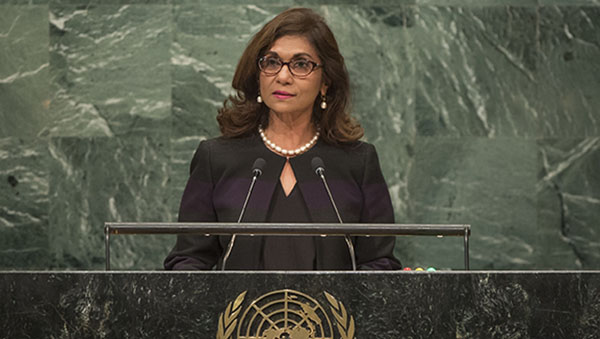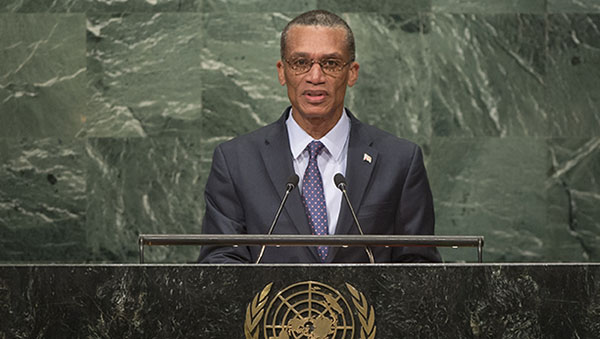UNITED NATIONS, New York September 26, 2016 (CMC) – Two Caribbean Community (CARICOM) countries, Monday, expressed support for the 2030 Sustainable Development Agenda (SDA), even as they appealed to the international community to help make the goals a reality, by removing policies that could stifle the socio-economic development of small island developing states (SIDS).
Trinidad and Tobago and Suriname told the 71st United Nations General Assembly (UNGA) that they were prepared to implement the goals attached to the SDA, but also believed that policies such as corresponding banking by some developed countries were affecting the economic future of their countries.
Trinidad and Tobago Foreign Affairs Minister, Denis Moses, said that the national Vision 2030 Plan is currently in the final stages of elaboration, and is in alignment with the sustainable development goals.
He said Port of Spain “recognizes that the 2030 Agenda is a transformative plan of action for people, planet and prosperity through peace and partnership” and that the Keith Rowley government is, accordingly, committed to its full implementation, through mainstreaming the principles of sustainability throughout its spectrum of policy.
“The thrust of the 2030 Agenda for global transformation, whereby no one is left behind, calls for action to enhance the quality of life of all segments of society, including those groups who are systematically marginalized.
“Among those groups, I include women, girls and the differently-abled, who have historically been denied equitable access to opportunity and mobility that would ensure their participation in society as equal partners with men and the enhancement not only of their own quality of life and happiness, but also that of the family, community and society as a whole,” the Foreign Affairs Minister said.
But Moses added it is “deeply regrettable that in many parts of the world, women and girls, and the differently-abled continue to be denied fundamental human rights and freedoms, are not equally paid for equal work as men, and are systematically prevented from obtaining an education and reaching their full potential as human beings and as citizens”.
He stated that Trinidad and Tobago remains committed to raising the standard of living and welfare of all members of the national community, the enhancement of the educational system, improving the delivery of health care and providing a higher level of accessibility and support to persons with disabilities.
But he told the UNGA that one of the defining challenges is that of addressing the issue of climate change and global temperature increase.
“Notwithstanding our miniscule contribution to absolute global emissions, for small island developing states such as Trinidad and Tobago, unmitigated climate change poses an existential threat. In this circumstance, the future viability and existence of our island state is dependent on the urgency for, and level of ambition in global response to reverse the already unsustainable trend of global temperature increase.
“Consequently, Trinidad and Tobago joins with the international community in endorsing the Paris Agreement as a sign of hope for the future. In particular, we wish to emphasize that this Agreement prioritizes the need for joint global action on the critical issue of climate change, an approach, which for us, is absolutely imperative if we are to have a chance at averting its most dangerous effects,” he noted.
He said while Trinidad and Tobago is a signatory of the Paris agreement, it also recognizes that the conversation surrounding the Paris Agreement is now focused on building momentum towards its early entry into force.
“To that end, the government is actively in the process of treating with the issue of ratification.
Trinidad and Tobago also looks forward to the deliberations at COP22 in Marrakesh as we work towards the full and effective implementation of the Paris Agreement on a scale that will support international cooperation on mitigation, adaptation and compliance to ensure that the increase in average global temperatures is limited to the preferred 1.5 degrees Celsius,” he continued.
Moses said that while the government is aggressively pursuing a national economic diversification strategy, which will also strengthen the country’s resilience to exogenous shocks in global markets, it continues to explore innovative measures to bolster its economic stability and capacity to remain properly integrated in the global financial and trade architecture.

Niermala S. Badrising, Minister for Foreign Affairs of the Republic of Suriname, addresses the general debate of the General Assembly’s seventy-first session.
For its part, Suriname acknowledged that the 2030 Agenda for Sustainable Development places human beings at the center of development.
“The implementation of the ambitious Sustainable Development Goals gives us the opportunity to indeed fight for a just world order, in order to achieve peace, equitable power relations in the world, political and social stability, as well as an equal distribution of wealth and opportunities for all. This would indicate that, eventually, the eradication of poverty and the promotion of economic growth can be attained,” said Foreign Affairs Minister, Niermala Badrising.
She added nevertheless, “there is a wide gap between what we promise our peoples at international and regional fora and what is actually achieved.
“Suriname believes that we must build peaceful and inclusive societies with equal opportunities for all. It is, therefore, essential that our social and economic order be structurally reformed, and that we focus on advancing innovation and technologies, as well as human knowledge, capacities and skills.
“We need this to ultimately contribute to a solution, which will create opportunities to embed knowledge, increase employment and social protection, boost social inclusion, protect the environment, and which will eventually lead to sustainable growth and stability,” she said.
The Foreign Minister said that it is not by chance that the SDA includes migration, “nor is it a coincidence that we are discussing the matter of migration as a top priority of the international community”.
“The movement of people across international boundaries – be it as migrants, refugees or asylum seekers – continues to be one of the most important issues of the global policy agenda, for it generates enormous economic, social, and cultural implications.
“As far as refugees and asylum seekers are concerned, Suriname holds the view that international norms, values and principles must be upheld, and that human rights must be respected,” she told the international community.
 Pride News Canada's Leader In African Canadian & Caribbean News, Views & Lifestyle
Pride News Canada's Leader In African Canadian & Caribbean News, Views & Lifestyle





